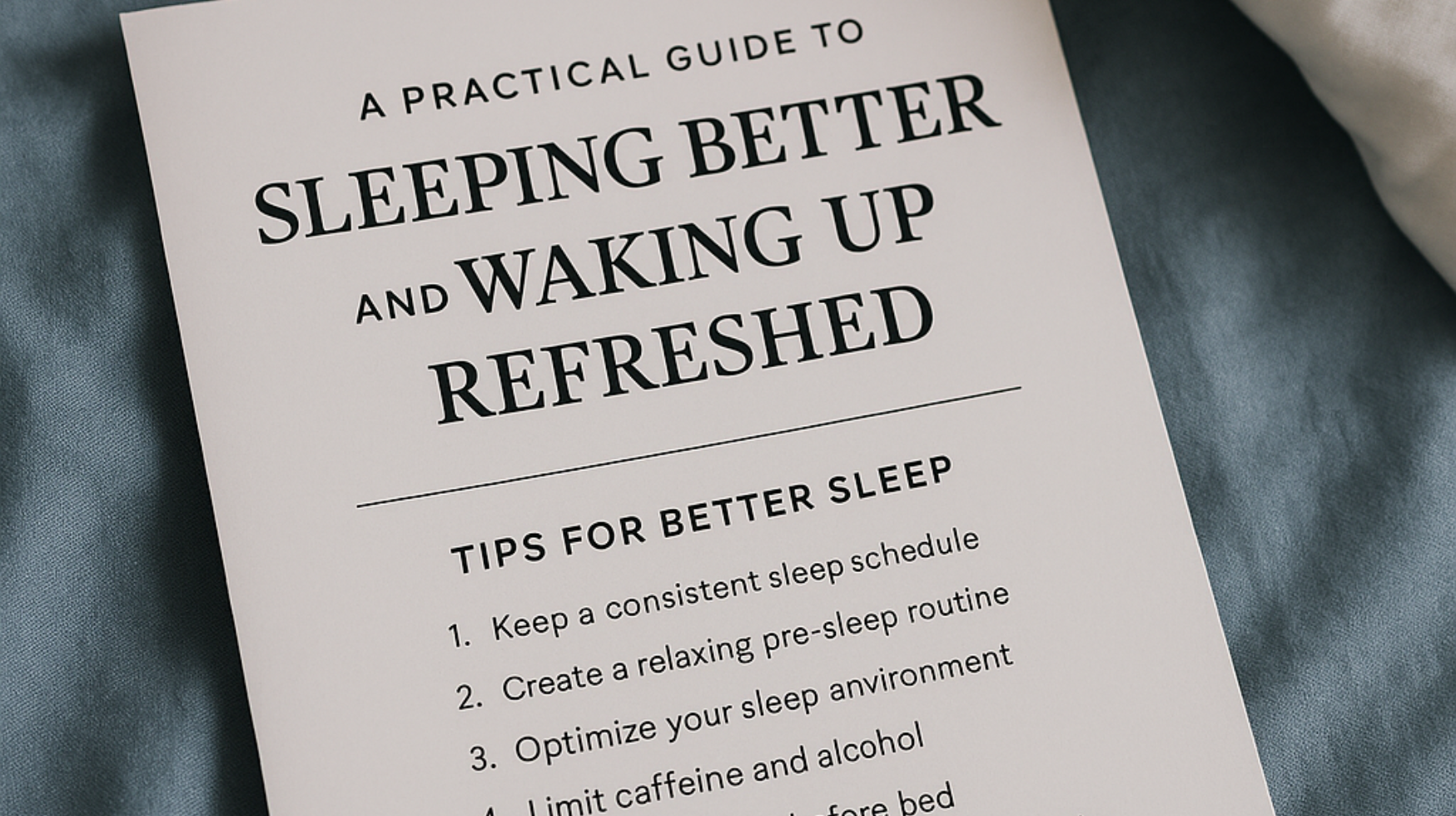Sleep is one of the most fundamental human needs, yet in today’s fast-paced world, it’s often the first thing we sacrifice. We live in a culture that glorifies productivity and “hustle,” but the reality is that without adequate, high-quality sleep, our productivity, creativity, and health suffer.
Many people experience chronic sleep deprivation without realizing it. You might think getting 5–6 hours is “good enough,” but over time, this lack of rest can have serious consequences on your mental health, physical performance, immune system, and emotional stability.
The good news is that sleeping better is not about luck or genetics—it’s about creating the right conditions, both physically and mentally, for your body to rest and recharge. This guide will show you the science behind sleep, common mistakes that keep you awake, and practical strategies to improve your rest so you can wake up feeling truly refreshed.
Why Quality Sleep Is Non-Negotiable
Before diving into the “how,” it’s important to understand the “why.” Sleep is not just a passive state where your body does nothing—it’s an active process where vital functions take place:
- Memory consolidation – Your brain processes and stores new information.
- Tissue repair – Muscles and cells repair damage from daily activity.
- Hormone regulation – Hormones that control appetite, stress, and growth are balanced.
- Immune system boost – Your body produces proteins that fight infection.
Sleep deprivation can cause:
- Slower reaction times and reduced focus
- Increased anxiety and irritability
- Higher risk of chronic illnesses like diabetes, heart disease, and obesity
- Lowered immunity, making you more prone to illness
According to the National Sleep Foundation, adults need 7–9 hours of quality sleep per night for optimal health.
Understanding the Sleep Cycle
Your body cycles through four distinct sleep stages multiple times per night:
- NREM Stage 1 – Light sleep where you drift in and out.
- NREM Stage 2 – Heart rate slows, body temperature drops, and you prepare for deep sleep.
- NREM Stage 3 – Deep sleep where tissue repair and growth occur.
- REM Sleep – Rapid eye movement stage where dreams happen and memory consolidation takes place.
Each cycle lasts about 90 minutes, and you go through 4–6 cycles per night. Interruptions during deep or REM sleep can leave you feeling groggy in the morning, even if you’ve slept for many hours.
Signs You’re Not Getting Quality Sleep
Even if you’re in bed for 8 hours, poor sleep quality can leave you feeling exhausted. Watch out for these warning signs:
- Difficulty waking up in the morning
- Feeling sleepy during the day, especially in meetings or while driving
- Mood swings or irritability
- Frequent headaches
- Trouble concentrating or remembering details
The Main Causes of Poor Sleep
Many lifestyle habits unknowingly interfere with sleep:
- Excessive caffeine late in the day
- Blue light exposure from phones, TVs, and laptops before bed
- Irregular sleep schedule due to shift work or inconsistent bedtime
- Stress and anxiety that keep the mind overactive
- Poor bedroom environment (too hot, too noisy, too bright)
The key is to identify your personal sleep disruptors and take action to remove them.
Step-by-Step Strategies for Sleeping Better
Here’s a comprehensive, actionable plan for improving your sleep quality:
1. Stick to a Consistent Schedule
Go to bed and wake up at the same time every day, even on weekends. This strengthens your body’s circadian rhythm, making it easier to fall asleep naturally.
Pro tip: Use the “15-minute rule” to adjust your bedtime gradually. If you currently sleep at midnight but want to sleep at 10 PM, shift your bedtime by 15 minutes every 3–4 nights until you reach your goal.
2. Build a Pre-Sleep Routine
A calming ritual before bed tells your body it’s time to wind down.
Ideas:
- Dim the lights an hour before bedtime
- Read a paperback book (avoid screens)
- Take a warm bath or shower
- Practice deep breathing or meditation
3. Optimize Your Sleep Environment
Your bedroom should be a sleep sanctuary.
Make it comfortable:
- Keep the temperature cool (18–21°C / 65–70°F)
- Use blackout curtains or a sleep mask
- Block noise with earplugs or a white noise machine
- Invest in a high-quality mattress and pillows suited to your sleep position
4. Limit Stimulants
Caffeine can remain in your system for up to 8 hours. Avoid coffee, energy drinks, and even dark chocolate late in the afternoon.
Alcohol caution: While alcohol can make you feel sleepy, it disrupts REM sleep, leaving you less rested.
5. Reduce Blue Light Exposure
Phones, tablets, and TVs emit blue light that delays melatonin production.
Solutions:
- Turn off devices at least 1 hour before bed
- Use blue light–blocking glasses in the evening
- Enable night mode on your devices
6. Eat Smart in the Evening
Heavy meals, spicy foods, and high-sugar snacks can interfere with sleep.
Better choices:
- Herbal tea (chamomile, valerian root)
- Light snacks like yogurt with berries or a banana
- Foods high in magnesium (almonds, spinach)
7. Manage Stress and Anxiety
If racing thoughts keep you awake, create a mental “off switch.”
Techniques:
- Write down tomorrow’s to-do list before bed
- Practice gratitude journaling
- Use guided meditation apps for relaxation
8. Get Morning Sunlight
Natural light in the morning helps reset your circadian rhythm, making it easier to fall asleep at night.
Try:
- Walking outdoors after waking
- Having breakfast near a sunny window
9. Exercise (But Not Too Late)
Physical activity promotes better sleep, but intense workouts close to bedtime can be too stimulating. Aim for morning or early afternoon workouts.
10. Take Power Naps Wisely
If you need a nap, keep it under 30 minutes and avoid napping late in the day to prevent interfering with nighttime sleep.
Sleep Myths That Might Be Hurting You
- Myth: You can “catch up” on sleep during weekends.
- Reality: Irregular sleep disrupts your circadian rhythm.
- Myth: The older you get, the less sleep you need.
- Reality: Older adults still need about 7–8 hours, though they may sleep in shorter stretches.
- Myth: Watching TV helps you relax before bed.
- Reality: Blue light and stimulating content make it harder to sleep.
Sample Sleep-Optimizing Day Plan
Morning:
- Wake up at the same time
- Drink water
- Get 20 minutes of sunlight
Afternoon:
- Exercise or walk
- Avoid caffeine after 2 PM
Evening:
- Eat a light dinner 2–3 hours before bed
- Begin relaxing routine 1 hour before sleep
- No screens after 9 PM
- Bedtime at 10:30 PM
When to Seek Professional Help
If you’ve tried improving your sleep for several weeks without results, consider consulting a doctor or sleep specialist. Conditions like sleep apnea, restless legs syndrome, or chronic insomnia may require medical intervention.
Final Thoughts
Better sleep isn’t a luxury—it’s a foundation for a healthy, happy life. By following these science-backed strategies, you can create the ideal conditions for restorative sleep and wake up energized, focused, and ready to take on the day.
Remember, the goal is not just to sleep more—it’s to sleep better.

